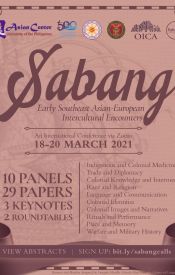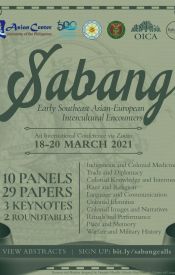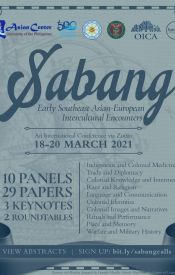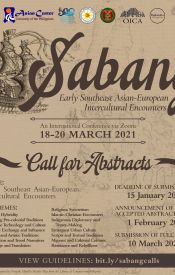MARCH 19: PROGRAM
Click/unclick on the tabs to view/close the content. Multiple tabs can be open at the same time.
Click on the titles to pop up the abstracts. View PDF of Program and Book of Abstracts.
08:15 am • Keynote 2: The Successful ‘Portuguese’ Encounter with the Malay-Indonesian World of the 16th Century
8:15 am–9:30 am
KEYNOTE ADDRESS
The Successful ‘Portuguese’ Encounter with the Malay-Indonesian World of the 16th Century
Prof. Leonard Y. Andaya, University of Hawaii at Manoa
The encounter of the Portuguese with the Malay Indonesian world of the 16th century was characterized by the complementarity of both the “white” or European Portuguese and the “black” Portuguese or those who were of overwhelmingly local Asian descent. While the former provided the model for Portugueseness, it was the latter who succeeded in blending it with local cultures that were crucial to the success of the Portuguese enterprise. The ability of the black Portuguese to understand local perceptions of meaningful unities of bodies of water—what in the Philippines is captured in the indigenous term “sabang”—enabled the Portuguese to establish thriving international hybrid entrepots at Melaka on the Malay Peninsula, at Makassar on the southwest peninsula of Sulawesi (Celebes) and at Larantuka in eastern Indonesia in the 16th and into the 17th centuries.
Profile
Leonard Y. Andaya, PhD is Professor of Southeast Asian Historyat the University of Hawai' at Manoa. He has written on the early modern history of Malaysia, Indonesia, the southern Philippines, and southern Thailand. He is the co-author of "A History of Early Modern Southeast Asia, 1400–1830" (2015).
09:45 am • Panel 4: Race and Religion

9:45 am–11:15 am
PANEL 4: RACE and RELIGION
Chinos Indios as Sexual Deviants: Sodomy as Colonial Trope of Moral Panic in the Early Spanish Philippines
Thomas David F. Chaves, University of the Philippines Diliman • Watch on YouTube
Christianity and Racism in Post-colonial Society: White Jesus, Black Piet and Normalized Racism in Ambon, Indonesia
Hanry Harlen Tapotubun, Christian State Institution, Ambon, Indonesia
Religious Syncretism of Libad Apung Iru and the Kapampangan Pre-colonial Beliefs
James Darwin N. Lagman, Mabalacat City College, Philippines • Watch on YouTube
12:15 pm • Panel 5: Language and Communication

12:15 pm–1:45 pm
Panel 5: Language and Communication
The Meaning Behind the Action: Study on Teungku Syik Kuta Karang Hand Writing Living in Colonial Era
Dr. Fakhriati, Center for Research and Development on Religious Literature and Heritage (WITHDREW)
Zamboanga Chavacano from "Hawker Spanish" to "Slightly Spanish": The Trajectory of a Creole's Social Prestige
Jillian Loise Melchor and Dr. Miguel Blázquez, Erasmus Mundus MA Crossways in Cultural Narratives, Department of European Languages (UP Diliman)
In the (re/un)ma(r)king: Batuk (Philippine Traditional Tattoos) in the Diaspora
Lovey Ann F. Marquez, KU Leuven • Watch on YouTube
02:00 pm • Panel 6: Colonial Identities

2:00 pm–3:30 pm
PANEL 6: COLONIAL IDENTITIES
To Reward Her for This Devotion - Catholic Manipulation of the Conversion of Early-Modern Philippine Women
Steven J. Fluckiger, University of Hawai‘i at Mānoa
Melchor de Avalos and the Political Status of Tagalog Muslims
Isaac Donoso, University of Alicante, Spain • Watch on YouTube
The Imposition of the Sorbonne Method in the Formation of an Indigenous Clergy in South-East Asia: the Example of Siam in 1685
Maëlle Pennéguès, University Lumière Lyon II, France
03:45 pm • Roundtable 2: Locating Early Modern Southeast Asia

3:45 pm–5:00 pm
ROUNDTABLE 2: Locating Early Modern Southeast Asia
Discussion Questions
- Can you describe the regional and global connections made or unmade during the early modern period (c.1400-1800) in Southeast Asia? What do you think were the impact of European arrival to various states and societies in Southeast Asia during this period?
- Conversely, what do you think were the impact of early Southeast Asian-European interaction in the politics and societies in Europe, if at all?
- How important was the early period of Southeast Asian-European interaction to the later political trajectory of colonial and postcolonial states in the region?
- In your view, what are the themes, sources, approaches, geographic regions that remain frontiers for research on early modern Southeast Asia?
Participants
Joefe B. Santarita, PhD
Dean and Professor, Asian Center, University of the Philippines Diliman
Ariel C. Lopez, PhD
Assistant Professor, Asian Center, University of the Philippines Diliman
David Henley, PhD
Professor, Leiden University, Netherlands
Stefan Amirell, PhD
Professor, Linnaeus University, Sweden
08:15 am • Keynote 2: The Successful ‘Portuguese’ Encounter with the Malay-Indonesian World of the 16th Century
8:15 am–9:30 am
KEYNOTE ADDRESS
The Successful ‘Portuguese’ Encounter with the Malay-Indonesian World of the 16th Century
Prof. Leonard Y. Andaya, University of Hawaii at Manoa
The encounter of the Portuguese with the Malay Indonesian world of the 16th century was characterized by the complementarity of both the “white” or European Portuguese and the “black” Portuguese or those who were of overwhelmingly local Asian descent. While the former provided the model for Portugueseness, it was the latter who succeeded in blending it with local cultures that were crucial to the success of the Portuguese enterprise. The ability of the black Portuguese to understand local perceptions of meaningful unities of bodies of water—what in the Philippines is captured in the indigenous term “sabang”—enabled the Portuguese to establish thriving international hybrid entrepots at Melaka on the Malay Peninsula, at Makassar on the southwest peninsula of Sulawesi (Celebes) and at Larantuka in eastern Indonesia in the 16th and into the 17th centuries.
Profile
Leonard Y. Andaya, PhD is Professor of Southeast Asian Historyat the University of Hawai' at Manoa. He has written on the early modern history of Malaysia, Indonesia, the southern Philippines, and southern Thailand. He is the co-author of "A History of Early Modern Southeast Asia, 1400–1830" (2015).
09:45 am • Panel 4: Race and Religion

9:45 am–11:15 am
PANEL 4: RACE and RELIGION
Chinos Indios as Sexual Deviants: Sodomy as Colonial Trope of Moral Panic in the Early Spanish Philippines
Thomas David F. Chaves, University of the Philippines Diliman • Watch on YouTube
Christianity and Racism in Post-colonial Society: White Jesus, Black Piet and Normalized Racism in Ambon, Indonesia
Hanry Harlen Tapotubun, Christian State Institution, Ambon, Indonesia
Religious Syncretism of Libad Apung Iru and the Kapampangan Pre-colonial Beliefs
James Darwin N. Lagman, Mabalacat City College, Philippines • Watch on YouTube
12:15 pm • Panel 5: Language and Communication

12:15 pm–1:45 pm
Panel 5: Language and Communication
The Meaning Behind the Action: Study on Teungku Syik Kuta Karang Hand Writing Living in Colonial Era
Dr. Fakhriati, Center for Research and Development on Religious Literature and Heritage (WITHDREW)
Zamboanga Chavacano from "Hawker Spanish" to "Slightly Spanish": The Trajectory of a Creole's Social Prestige
Jillian Loise Melchor and Dr. Miguel Blázquez, Erasmus Mundus MA Crossways in Cultural Narratives, Department of European Languages (UP Diliman)
In the (re/un)ma(r)king: Batuk (Philippine Traditional Tattoos) in the Diaspora
Lovey Ann F. Marquez, KU Leuven • Watch on YouTube
02:00 pm • Panel 6: Colonial Identities

2:00 pm–3:30 pm
PANEL 6: COLONIAL IDENTITIES
To Reward Her for This Devotion - Catholic Manipulation of the Conversion of Early-Modern Philippine Women
Steven J. Fluckiger, University of Hawai‘i at Mānoa
Melchor de Avalos and the Political Status of Tagalog Muslims
Isaac Donoso, University of Alicante, Spain • Watch on YouTube
The Imposition of the Sorbonne Method in the Formation of an Indigenous Clergy in South-East Asia: the Example of Siam in 1685
Maëlle Pennéguès, University Lumière Lyon II, France
03:45 pm • Roundtable 2: Locating Early Modern Southeast Asia

3:45 pm–5:00 pm
ROUNDTABLE 2: Locating Early Modern Southeast Asia
Discussion Questions
- Can you describe the regional and global connections made or unmade during the early modern period (c.1400-1800) in Southeast Asia? What do you think were the impact of European arrival to various states and societies in Southeast Asia during this period?
- Conversely, what do you think were the impact of early Southeast Asian-European interaction in the politics and societies in Europe, if at all?
- How important was the early period of Southeast Asian-European interaction to the later political trajectory of colonial and postcolonial states in the region?
- In your view, what are the themes, sources, approaches, geographic regions that remain frontiers for research on early modern Southeast Asia?

